Margaret Thatcher: London halts for ceremonial funeral
- Published
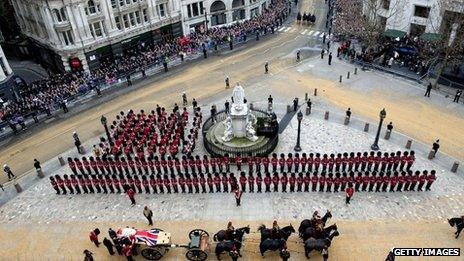
Crowds lined the procession route, some arriving more than 24 hours before the funeral
Much of central London came to a standstill for the funeral of Britain's first female prime minister, Margaret Thatcher. What was the view of the occasion from the crowds?
Beneath an overcast sky, the bell of St Paul's Cathedral tolled and, as if commanded to do so, the crowds fell silent.
Chattering tourists, racing office workers and the roar of the traffic all paused as Baroness Thatcher made her final journey.
It was a journey that began shortly after 10:00 BST in the heart of Westminster - where the then MP started her political career more than half a century ago - and ended in the grand setting of the cathedral.
And as the crowd saw the Iron Lady's union-jack-draped coffin pass by, heads - and cameras - were held high and solemn applause rang out.
'Into the light'
Some had waited more than 24 hours to catch a glimpse of the funeral procession from behind barriers, with only rain coats, fold-up chairs, and tea and sandwiches for comfort.
Many said they had made the journey because they were full of admiration for Lady Thatcher.
John Loughrey, 58, from Wandsworth, south-west London, who arrived early the day before the funeral, said: "My main focus is to pay my final respects to Mrs Thatcher.
"She brought us into the light and out of the dark ages. I don't think I will see the likes of her again in my lifetime. She is an icon of the 20th Century."
Margaret Kittle, 79, who travelled to London from Winona in Ontario, Canada, for the funeral, said she admired Lady Thatcher for keeping the Falkland Islands in British control, opening the Iron Curtain and taking on the unions.
"She was a strong woman. She made Britain great again," she said.
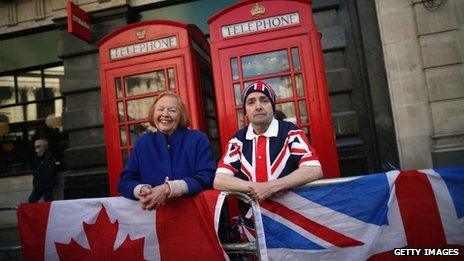
John Loughley and Margaret Kittle stand outside St Paul's Cathedral as they prepare to sleep on the street overnight ahead of the funeral
David Lydiat, 25, a Conservative town councillor in Chipping Norton, was dressed in a black suit and tie and carried a bunch of pink and white flowers to lay in tribute.
"I wanted to take the last opportunity to pay my respects to Margaret Thatcher and say thank you," he said.
"She was a woman who showed tremendous courage in the face of so much opposition - [for example] over militant unions who had a strangle-hold on this country in the 70s. Margaret Thatcher liberated our country from them and liberated the economy.
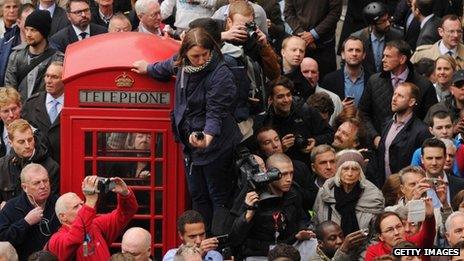
Onlookers tried to get the best possible vantage point to glimpse the Iron Lady for the last time
"She was the first woman to become prime minister in a government dominated by men and that was a remarkable thing."
He added: "I would say she was the greatest Briton and prime minister since Winston Churchill."
'Raise a glass'
For others, it brought back strong memories.
Sue Bloxham from Norfolk, was on duty at former Prime Minister Sir Winston Churchill's funeral on 30 January 1965 as a 20-year-old City of London policewoman.
"I was standing just a few yards away from this point," she said, gesturing from her spot in front of two bright red phone boxes directly opposite St Paul's.
"It feels strange, I feel almost wobbly.
"There's not the same patriotism that there was for him. We were there united in supporting him. There's one or two people round here today who are not being very respectful."
Pausing, she added: "One of the things in my rather forgetful memory is the sight of the cranes in the docks bowing down as Churchill went past in the barge.
"It was wonderful and it was sad. I just felt I should be here today."
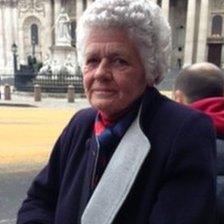
It brought back memories of Winston Churchill's funeral for Sue Bloxham
Stuart MacKenzie, 52, from London, who was a corporal in the Parachute Regiment during the Falklands conflict, said he simply wanted to "nod my head and show respect".
"There's about 100 other paratroopers here and we will meet up afterwards and raise a glass to Maggie," he added.
Lady Thatcher's supporters were certainly present - and so too were her detractors. Despite fears the events could turn sour, however, mourners - and even police and journalists - appeared to greatly outnumber protesters near St Paul's.
Henry Page, 61, from Brighton, was undeterred from his protest, holding aloft a banner saying: "Over £10m of our money for a Tory funeral".
"People might say my protest is inappropriate, undignified or vulgar, but how undignified is it for David Cameron and Boris Johnson to be falling over themselves to make Margaret Thatcher's funeral more pompous?" he said.
Protester Dominic Burrows, 45, from Southend-on-Sea, who wore a V for Vendetta mask, said he was happy to demonstrate peacefully and silently over what he saw as the grand way in which her death was being marked.
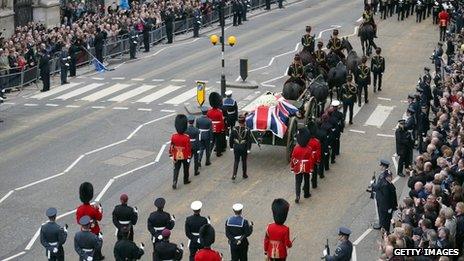
Those who had waited hours witnessed a spectacular ceremonial funeral procession
At one point along the route, a group of protesters turned their backs on Lady Thatcher's coffin.
Meanwhile, outside St Paul's a protester with a megaphone was drowned out by booing and countered with an impromptu rendition of Land of Hope and Glory.
'Emotional day'
For some, being at St Paul's was about witnessing history.
Lesleyann Coker, 37, who was visiting from California, said she had never seen anything like it.
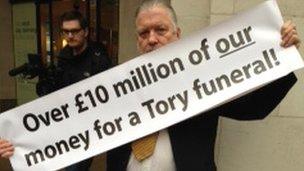
Close to St Paul's protesters appeared to be alone rather than in groups
"When the carriage passed by I kept saying, 'Wow.' I got goosebumps and I'm still shaking," she said.
She said she admired "the spectacle, pageantry and emotion of the day".
"I didn't expect to feel quite so emotional, but the crowd was just so respectful and silent. It was nice to see everyone give her a proper send off," she added.
Delroy Constantine-Simms, from Hampshire, said attending the sombre occasion was "about being part of history and chronicling that history for my family".
Following the funeral, the hearse containing Lady Thatcher's coffin wound its way to the Royal Hospital Chelsea, ahead of a private cremation at Mortlake Crematorium in south-west London.
Fitting then, that one of the biggest cheers of the day was reserved for the pensioners of the hospital as they formed a guard of honour on the cathedral steps.
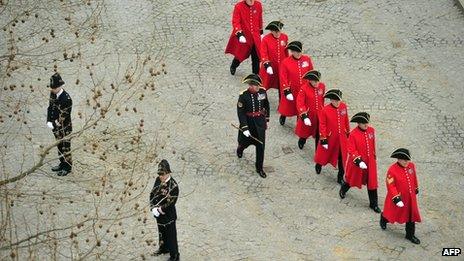
The Chelsea pensioners were hailed by the crowd when they arrived
One stood a little too far forward and was shuffled back into place by his commanding officer.
No detail was overlooked on this most British of occasions.